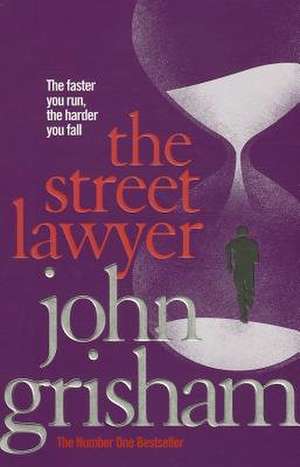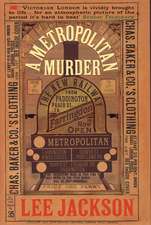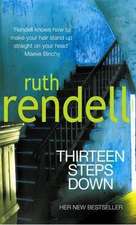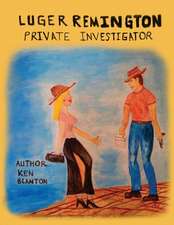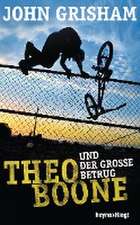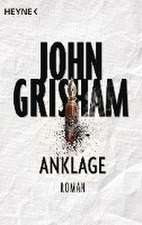The Street Lawyer
Autor John Grishamen Limba Engleză Paperback – 28 oct 2010
| Toate formatele și edițiile | Preț | Express |
|---|---|---|
| Paperback (3) | 54.02 lei 24-30 zile | +20.54 lei 5-11 zile |
| CORNERSTONE – 28 oct 2010 | 54.02 lei 24-30 zile | +20.54 lei 5-11 zile |
| Dell Publishing Company – 31 oct 2010 | 59.17 lei 3-5 săpt. | |
| Bantam – 31 mar 2005 | 98.37 lei 3-5 săpt. |
Preț: 54.02 lei
Preț vechi: 63.92 lei
-15% Nou
10.34€ • 10.75$ • 8.53£
Carte disponibilă
Livrare economică 27 martie-02 aprilie
Livrare express 08-14 martie pentru 30.53 lei
Specificații
ISBN-10: 0099537192
Pagini: 368
Dimensiuni: 131 x 200 x 27 mm
Greutate: 0.26 kg
Editura: CORNERSTONE
Locul publicării:United Kingdom
Recenzii de la cititorii Books Express
Ioana Marculesteanu a dat nota:
Nu l-am descoperit pe John Grisham decât anul acesta. Din greșeală, și fără să îi ofer prea multe șanse inițial – nu se încadra în genul pe care l-aș fi ales pentru lecturile mele. Am început cu „Avocatul străzii”, în care Grisham aduce în prim plan călătoria unui tânăr avocat care alege să lupte împotriva sistemului și ia decizii șocante pentru cei din jurul său. Aflat în plină ascensiune, cu un job care-i oferă un confort financiar crescut și cu perspective solide de a evolua și a obține postul pe care și l-a dorit dintotdeauna, Michael Brock alege să devină apărătorul celor fără adăpost. De ce alege astfel? O întâmplare la care ia parte îl intrigă atât de mult, încât se hotărăște să afle cauzele ce au putut să o declanșeze, cine este de fapt vinovatul, cine ar putea fi responsabil și tras la răspundere, precum și dacă evenimentul ar fi putut fi evitat. John Grisham reușește, cu o logică fără cusur, sclipitoare pe alocuri, să construiască o imagine a sistemului astfel încât să poată începe demontarea acestuia. Realizând o radiografie detaliată a sistemului deja bolnav de care aparține, Michael Brock identifică legături capabile să îi ofere răspunsurile pe care le caută. Cartea abundă în detalii legislative, însă nu este deranjant. Cumva sunt inserate elegant, nu încetinesc viteza de citit și limbajul este accesibil chiar și pentru necunoscătorii domeniului. Cu o poveste care debutează direct cu intriga, primele câteva pagini mi-au fost suficiente pentru a nu o mai lăsa din mână și a ști că așteptările îmi vor fi cu siguranță depășite. Subiectul ales pentru carte evidențiază clar diferențele dintre clasele sociale din Washington și oferă o imagine reală a oamenilor străzii, a problemelor cu care se confruntă, a nedreptăților la care sunt supuși, a direcțiilor triste pe care destinele lor le iau și a neputinței lor în fața deciziilor celor mai puternici. Regulile străzii nu sunt compatibile cu regulile societății, iar atitudinea celor „de sus” care se bucură de putere și deciziile pe care le iau fără să se gândească măcar la cei ai străzii produc efecte la care nu m-aș fi așteptat. Mi-a plăcut cum a fost construit Michael Brock, cu o empatie și o implicare dusă la extrem și având puterea de a lua decizia despre care știa că va duce cu siguranță la o schimbare radicală în viața lui. Personajele care întregesc tabloul din „Avocatul străzii” nu sunt numeroase, dar fiecare reușește să își aducă aportul în povestea lui Michael. M-a surspins cartea prin prisma suspansului pe care a reușit Grisham să îl creeze. Mi-am pus întrebări, am presupus lucruri, am crezut în niște variante, dar răspunsurile oferite pe parcursul lecturii au schimbat total perspectiva. O carte care te ține cu sufletul la gură și care mi-a deschis apetitul pentru thrillere. Așa aș descrie-o. Textul e aerisit, cu fraze accesibile și ușor de înțeles. „Avocatul străzii”, dincolo de a-mi fi lectură, mi-a fost o lecție. O lecție despre viață și cât de complicat e să lupți împotriva celorlalți. Și aș recomanda-o oricărei persoane ce este dispusă să iasă din zona de confort în ceea ce privește lectura, ce își dorește o poveste plină de suspans, ancorată foarte bine în realitate, incitantă. O întrebare pe care mi-am pus-o în timp ce citeam a fost următoarea:„Dacă asemenea lucruri se întâmplă și astăzi?”. Și am început să mă gândesc dacă nu cumva am devenit prea puțin empatici, prea prinși în cotidianul nostru pentru a ne mai uita și la ceilalți. O cafea bună și „Avocatul străzii” a lui Grisham ar putea fi rețeta de succes pentru o după amiază liniștită. Vei reuși, la fel ca mine, să te transpui într-o lume în care se încearcă demontarea unui sistem bolnav, problemă care, la fel ca în zilele noastre, este mult mai profundă și mai complicată decât ai crede. N-aș vrea să ofer vreun spoiler, ar fi păcat. Nu rămâne decât să încerci și tu povestea, să îți extragi propriile lecții, să îți pui propriile întrebări și, de ce nu, să le găsești și răspunsurile potrivite. Voi lăsa aici, însă, un fragment din carte: „Situația se schimbase. Lucrul nu mai era important. Biroul meu nu mai însemna o chestiune de viață și de moarte. […] , și eram un naiv dacă îmi închipuiam că pot pur și simplu să dau din umeri și să iau totul de la capăt, ca și cum nimic nu s-ar fi întâmplat.”. Dacă va reuși sau nu Michael Brock să învingă și să-și atingă obiectivele, rămâne de văzut. Ceea ce este important, e întreaga călătorie. Poate că ești la prima carte ce aparține genului thriller, la fel ca mine, sau poate că nu. Nu am cu ce alt thriller să o compar, dar pe mine m-a cucerit. Și cu siguranță voi continua și cu alte cărți scrise de John Grisham.
Notă biografică
From the Paperback edition.
Extras
The man with the rubber boots stepped into the elevator behind me, but I didn't see him at first. I smelled him though--the pungent odor of smoke and cheap wine and life on the street without soap. We were alone as we moved upward, and when I finally glanced over I saw the boots, black and dirty and much too large. A frayed and tattered trench coat fell to his knees. Under it, layers of foul clothing bunched around his midsection, so that he appeared stocky, almost fat. But it wasn't from being well fed; in the wintertime in D.C., the street people wear everything they own, or so it seems.
He was black and aging--his beard and hair were half-gray and hadn't been washed or cut in years. He looked straight ahead through thick sunglasses, thoroughly ignoring me, and making me wonder for a second why, exactly, I was inspecting him.
He didn't belong. It was not his building, not his elevator, not a place he could afford. The lawyers on all eight floors worked for my firm at hourly rates that still seemed obscene to me, even after seven years.
Just another street bum in from the cold. Happened all the time in downtown Washington. But we had security guards to deal with the riffraff.
We stopped at six, and I noticed for the first time that he had not pushed a button, had not selected a floor. He was following me. I made a quick exit, and as I stepped into the splendid marble foyer of Drake & Sweeney I glanced over my shoulder just long enough to see him standing in the elevator, looking at nothing, still ignoring me.
Madam Devier, one of our very resilient receptionists, greeted me with her typical look of disdain. "Watch the elevator," I said.
"Why?"
"Street bum. You may want to call security."
"Those people," she said in her affected French accent.
"Get some disinfectant too."
I walked away, wrestling my overcoat off my shoulders, forgetting the man with the rubber boots. I had nonstop meetings throughout the afternoon, important conferences with important people. I turned the corner and was about to say something to Polly, my secretary, when I heard the first shot.
Madam Devier was standing behind her desk, petrified, staring into the barrel of an awfully long handgun held by our pal the street bum. Since I was the first one to come to her aid, he politely aimed it at me, and I too became rigid.
"Don't shoot," I said, hands in the air. I'd seen enough movies to know precisely what to do.
"Shut up," he mumbled, with a great deal of composure.
There were voices in the hallway behind me. Someone yelled, "He's got a gun!" And then the voices disappeared into the background, growing fainter and fainter as my colleagues hit the back door. I could almost see them jumping out the windows.
To my immediate left was a heavy wooden door that led to a large conference room, which at that moment happened to be filled with eight lawyers from our litigation section. Eight hard-nosed and fearless litigators who spent their hours chewing up people. The toughest was a scrappy little torpedo named Rafter, and as he yanked open the door saying "What the hell?" the barrel swung from me to him, and the man with the rubber boots had exactly what he wanted.
"Put that gun down," Rafter ordered from the doorway, and a split second later another shot rang through the reception area, a shot that went into the ceiling somewhere well above Rafter's head and reduced him to a mere mortal. Turning the gun back to me, he nodded, and I complied, entering the conference room behind Rafter. The last thing I saw on the outside was Madam Devier shaking at her desk, terror-stricken, headset around her neck, high heels parked neatly next to her wastebasket.
The man with the rubber boots slammed the door behind me, and slowly waved the gun through the air so that all eight litigators could admire it. It seemed to be working fine; the smell of its discharge was more noticeable than the odor of its owner.
The room was dominated by a long table, covered with documents and papers that only seconds ago seemed terribly important. A row of windows overlooked a parking lot. Two doors led to the hallway.
"Up against the wall," he said, using the gun as a very effective prop. Then he placed it very near my head, and said, "Lock the doors."
Which I did.
Not a word from the eight litigators as they scrambled backward. Not a word from me as I quickly locked the doors, then looked at him for approval.
For some reason, I kept thinking of the post office and all those horrible shootings--a disgruntled employee returns after lunch with an arsenal and wipes out fifteen of his co-workers. I thought of the playground massacres--and the slaughters at fast-food restaurants.
And those victims were innocent children and otherwise decent citizens. We were a bunch of lawyers!
Using a series of grunts and gun thrusts, he lined the eight litigators up against the wall, and when their positions suited him he turned his attention to me. What did he want? Could he ask questions? If so, he could get anything he damned well pleased. I couldn't see his eyes because of the sunglasses, but he could see mine. The gun was pointed at them.
He removed his filthy trench coat, folded it as if it were new, and placed it in the center of the table. The smell that had bothered me in the elevator was back, but not important now. He stood at the end of the table and slowly removed the next layer--a bulky gray cardigan.
Bulky for a reason. Under it, strapped to his waist, was a row of red sticks, which appeared to my untrained eye to be dynamite. Wires ran like colored spaghetti from the tops and bottoms of the sticks, and silver duct tape kept things attached.
My first instinct was to bolt, to lunge with arms and legs flapping and flailing for the door, and hope for luck, hope for a bad shot as I scrambled for the lock, then another bad shot as I fell through the doorway into the hallway. But my knees shook and my blood ran cold. There were gasps and slight moans from the eight against the wall, and this perturbed our captor. "Please be quiet," he said in the tone of a patient professor. His calmness unnerved me. He adjusted some of the spaghetti around his waist, then from a pocket in his large trousers produced a neat bundle of yellow nylon rope and a switchblade.
For good measure, he waved the gun at the horrified faces in front of him, and said, "I don't want to hurt anybody."
That was nice to hear but hard to take seriously. I counted twelve red sticks--enough, I was certain, to make it instantaneous and painless.
Then the gun was back on me. "You," he said, "tie them up."
Rafter had had enough. He took one very small step forward and said, "Look, pal, just exactly what do you want?"
The third shot sailed over his head into the ceiling, where it lodged harmlessly. It sounded like a cannon, and Madam Devier or some female shrieked in the foyer. Rafter ducked, and as he attempted to stand upright the beefy elbow of Umstead caught him squarely in the chest and returned him to his position against the wall.
"Shut up," Umstead said with clenched jaws.
"Do not call me Pal," the man said, and Pal was instantly discarded as a reference.
"What would you like us to call you?" I asked, sensing that I was about to become the leader of the hostages. I said this very delicately, with great deference, and he appreciated my respect.
"Mister," he said. Mister was perfectly fine with everyone in the room.
The phone rang, and I thought for a split second he was going to shoot it. Instead he waved it over, and I placed it squarely before him on the table. He lifted the receiver with his left hand; his right still held the gun, and the gun was still pointed at Rafter.
If the nine of us had a vote, Rafter would be the first sacrificial lamb. Eight to one.
"Hello," Mister said. He listened briefly, then hung up. He carefully backed himself into the seat at the end of the table and sat down.
"Take the rope," he said to me.
He wanted all eight of them attached at the wrists. I cut rope and tied knots and tried my best not to look at the faces of my colleagues as I hastened their deaths. I could feel the gun at my back. He wanted them bound tightly, and I made a show of practically drawing blood while leaving as much slack as possible.
Rafter mumbled something under his breath and I wanted to slap him. Umstead was able to flex his wrists so that the ropes almost fell loose when I finished with him. Malamud was sweating and breathing rapidly. He was the oldest, the only partner, and two years past his first heart attack.
I couldn't help but look at Barry Nuzzo, my one friend in the bunch. We were the same age, thirty-two, and had joined the firm the same year. He went to Princeton, I went to Yale. Both of our wives were from Providence. His marriage was working--three kids in four years. Mine was in the final stage of a long deterioration.
Our eyes met and we both were thinking about his kids. I felt lucky to be childless.
The first of many sirens came into range, and Mister instructed me to close the blinds over the five large windows. I went about this methodically, scanning the parking lot below as if being seen might somehow save me. A lone police car sat empty with its lights on; the cops were already in the building.
And there we were, nine white boys and Mister.
At last count, Drake & Sweeney had eight hundred lawyers in offices around the world. Half of them were in D.C., in the building Mister was terrorizing. He instructed me to call "the boss" and inform him that he was armed and wired with twelve sticks of dynamite. I called Rudolph, managing partner of my division, antitrust, and relayed the message.
"You okay, Mike?" he asked me. We were on Mister's new speakerphone, at full volume.
"Wonderful," I said. "Please do whatever he wants."
"What does he want?"
"I don't know yet."
Mister waved the gun and the conversation was over.
Taking my cue from the pistol, I assumed a standing position next to the conference table, a few feet from Mister, who had developed the irritating habit of playing absentmindedly with the wires coiled against his chest.
He glanced down and gave a slight tug at a red wire. "This red one here, I give it a yank and it's all over." The sunglasses were looking at me when he finished this little warning. I felt compelled to say something.
"Why would you do that?" I asked, desperate to open a dialogue.
"I don't want to, but why not?"
I was struck by his diction--a slow, methodical rhythm with no hurry and each syllable getting equal treatment. He was a street bum at the moment, but there had been better days.
"Why would you want to kill us?" I asked.
"I'm not going to argue with you," he announced. No further questions, Your Honor.
Because I'm a lawyer and live by the clock, I checked my watch so that whatever happened could be duly recorded, if we somehow managed to survive. It was one-twenty. Mister wanted things quiet, and so we endured a nerve-racking period of silence that lasted fourteen minutes.
I could not believe that we were going to die. There appeared to be no motive, no reason to kill us. I was certain that none of us had ever met him before. I remembered the ride on the elevator, and the fact that he seemed to have no particular destination. He was just a nut in search of hostages, which unfortunately would have made the killings seem almost normal by today's standards.
It was precisely the kind of senseless slaughter that would grab the headlines for twenty-four hours and make people shake their heads. Then the dead lawyer jokes would start.
I could see the headlines and hear the reporters, but I refused to believe it would happen.
I heard voices in the foyer, sirens outside; a police radio squawked somewhere down the hallway.
"What did you eat for lunch?" Mister asked me, his voice breaking the silence. Too surprised to consider lying, I hesitated for a second, then said, "A grilled chicken Caesar."
"Alone?"
"No, I met a friend." He was a law school buddy from Philly.
"How much did it cost, for both of you?"
"Thirty bucks."
He didn't like this. "Thirty bucks," he repeated. "For two people." He shook his head, then looked at the eight litigators. If he polled them, I hoped they planned to lie. There were some serious stomachs among the group, and thirty bucks wouldn't cover their appetizers.
"You know what I had?" he asked me.
"No."
"I had soup. Soup and crackers at a shelter. Free soup, and I was glad to get it. You could feed a hundred of my friends for thirty bucks, you know that?"
I nodded gravely, as if I suddenly realized the weight of my sin.
"Collect all the wallets, money, watches, jewelry," he said, waving the gun again.
"May I ask why?" I asked.
"No."
I placed my wallet, watch, and cash on the table, and began rummaging through the pockets of my fellow hostages.
"It's for the next of kin," Mister said, and we all exhaled.
He instructed me to place the loot in a briefcase, lock it, and call "the boss" again. Rudolph answered on the first ring. I could envision the SWAT leader camped in his office.
"Rudolph, it's me, Mike, again. I'm on the speakerphone."
"Yes, Mike. Are you okay?"
"Just fine. Look, this gentleman wants me to open the door nearest the reception area and place a black briefcase in the hallway. I will then close the door and lock it. Understand?"
"Yes."
With the gun touching the back of my head, I slowly cracked the door and tossed the briefcase into the hallway. I did not see a person anywhere.
Few things can keep a big-firm lawyer from the joys of hourly billing. Sleep is one, though most of us slept little. Eating actually encouraged billing, especially lunch when the client was picking up the check. As the minutes dragged on, I caught myself wondering how in the world the other four hundred lawyers in the building would manage to bill while waiting for the hostage crisis to end. I could just see them out there in the parking lot, most of them sitting in their cars to keep warm, chatting away on cell phones, billing somebody. The firm, I decided, wouldn't miss a beat.
Some of the cutthroats down there didn't care how it ended. Just hurry up and get it over with.
Mister seemed to doze for a second. His chin dipped, and his breathing was heavier. Rafter grunted to get my attention, then jerked his head to one side as if to suggest I make a move. Problem was, Mister held the gun with his right hand, and if he was indeed napping, then he was doing so with the dreaded red wire held firmly in his left hand.
And Rafter wanted me to be the hero. Though Rafter was the meanest and most effective litigator in the firm, he was not yet a partner. He was not in my division, and we weren't in the Army. I didn't take orders.
"How much money did you make last year?" Mister, very much awake, asked me, his voice clear.
Again, I was startled. "I, uh, gosh, let me see--"
"Don't lie."
"A hundred and twenty thousand."
He didn't like this either. "How much did you give away?"
"Give away?"
"Yes. To charities."
"Oh. W
Two
Freshly annointed as scribe for the group, I sat where Mister pointed with the gun and clutched the faxes. My buddies had been standing for almost two hours, backs to the wall, still joined together, barely able to move, and they were beginning to slouch and slump and look miserable.
But their level of discomfort was about to rise significantly.
"You first," he said to me. "What's your name?"
"Michael Brock," I answered politely. Nice to meet you.
"How much money did you make last year?"
"I've already told you. A hundred and twenty thousand. Before taxes."
"How much did you give away?"
I was certain I could lie. I was not a tax lawyer, but I was confident I could dance around his questions. I found my 1040 and took my time flipping through the pages. Claire had earned thirty-one thousand dollars as a second-year surgical resident, so our gross income looked quite handsome. But we paid fifty-three thousand in taxes--federal income and an amazing variety of others--and after repayment of student loans, Claire's educational expenses, twenty-four hundred a month for a very nice apartment in Georgetown, two late-model cars with the obligatory mortgages, and a host of other costs naturally related to a comfortable lifestyle, we had invested only twenty-two thousand in mutual funds.
Mister was waiting patiently. In fact, his patience was beginning to unnerve me. I assumed that the SWAT boys were crawling in the air vents, climbing nearby trees, scampering across the roofs of buildings next door, looking at blueprints of our offices, doing all the things you see on TV with the goal of somehow placing a bullet through his skull, and he seemed oblivious to it. He had accepted his fate and was ready to die. Not true for the rest of us.
He continually toyed with the red wire, and that kept my heart rate over a hundred.
"I gave a thousand dollars to Yale," I said. "And two thousand to the local United Way."
"How much did you give to poor people?"
I doubted if the Yale money went to feed needy students. "Well, the United Way spreads the money around the city, and I'm sure some of it went to help the poor."
"How much did you give to the hungry?"
"I paid fifty-three thousand dollars in taxes, and a nice chunk of it went for welfare, Medicaid, aid to dependent children, stuff like that."
"And you did this voluntarily, with a giving spirit?"
"I didn't complain," I said, lying like most of my countrymen.
"Have you ever been hungry?"
He liked simple answers, and my wit and sarcasm would not be productive. "No," I said. "I have not."
"Have you ever slept in the snow?"
"No."
"You make a lot of money, yet you're too greedy to hand me some change on the sidewalk." He waved the gun at the rest of them. "All of you. You walk right by me as I sit and beg. You spend more on fancy coffee than I do on meals. Why can't you help the poor, the sick, the homeless? You have so much."
I caught myself looking at those greedy bastards along with Mister, and it was not a pretty sight. Most were staring at their feet. Only Rafter glared down the table, thinking the thoughts all of us had when we stepped over the Misters of D.C.: If I give you some change you'll (1) run to the liquor store, (2) only beg more, (3) never leave the sidewalk.
Silence again. A helicopter hovered nearby, and I could only imagine what they were planning in the parking lot. Pursuant to Mister's instructions, the phone lines were on hold, so there was no communication. He had no desire to talk to or negotiate with anyone. He had his audience in the conference room.
"Which of these guys makes the most money?" he asked me.
Malamud was the only partner, and I shuffled the papers until I found his.
"That would be me," Malamud offered.
"What is your name?"
"Nate Malamud."
I flipped through Nate's return. It was a rare moment to see the intimate details of a partner's success, but I got no pleasure from it.
"How much?" Mister asked me.
Oh, the joys of the IRS code. What would you like, sir? Gross? Adjusted gross? Net? Taxable? Income from salaries and wages? Or income from business and investments?
Malamud's salary from the firm was fifty thousand dollars a month, and his annual bonus, the one we all dreamed about, was five hundred and ten thousand. It had been a very good year, and we all knew it. He was one of many partners who had earned over a million dollars.
I decided to play it safe. There was lots of other income tucked away near the back of the return--rental properties, dividends, a small business--but I guessed that if Mister somehow grabbed the return he would struggle with the numbers.
"One point one million," I said, leaving another two hundred thousand on the table.
He contemplated this for a moment. "You made a million dollars," he said to Malamud, who wasn't the least bit ashamed of it.
"Yes, I did."
"How much did you give to the hungry, and the homeless?"
I was already scouring his itemized deductions for the truth.
"I don't recall exactly. My wife and I give to a lot of charities. I know there was a donation, I think for five thousand, to the Greater D.C. Fund, which, as I'm sure you know, distributes money to the needy. We give a lot. And we're happy to do it."
"I'm sure you're very happy," Mister replied, with the first hint of sarcasm.
He wasn't about to allow us to explain how generous we really were. He simply wanted the hard facts. He instructed me to list all nine names, and beside each write last year's income, then last year's gifts to charities.
It took some time, and I didn't know whether to hurry or be deliberate. Would he slaughter us if he didn't like the math? Perhaps I shouldn't hurry. It was immediately obvious that we rich folks had made lots of money while handing over precious little of it. At the same time, I knew the longer the situation dragged on, the crazier the rescue scenarios would become.
He hadn't mentioned executing a hostage every hour. He didn't want his buddies freed from jail. He didn't seem to want anything, really.
I took my time. Malamud set the pace. The rear was brought up by Colburn, a third-year associate who grossed a mere eighty-six thousand. I was dismayed to learn my pal Barry Nuzzo earned eleven thousand more than I did. We would discuss it later.
"If you round it off, it comes to three million dollars," I reported to Mister, who appeared to be napping again, with his fingers still on the red wire.
He slowly shook his head. "And how much for the poor people?"
"Total contributions of one hundred eighty thousand."
"I don't want total contributions. Don't put me and my people in the same class with the symphony and the synagogue, and all your pretty white folks clubs where you auction wine and autographs and give a few bucks to the Boy Scouts. I'm talking about food. Food for hungry people who live here in the same city you live in. Food for little babies. Right here. Right in this city, with all you people making millions, we got little babies starving at night, crying 'cause they're hungry. How much for food?"
He was looking at me. I was looking at the papers in front of me. I couldn't lie.
He continued. "We got soup kitchens all over town, places where the poor and homeless can get something to eat. How much money did you folks give to the soup kitchens? Any?"
"Not directly," I said. "But some of these charities--"
"Shut up!"
He waved the damned gun again.
"How about homeless shelters? Places we sleep when it's ten degrees outside. How many shelters are listed there in those papers?"
Invention failed me. "None," I said softly.
He jumped to his feet, startling us, the red sticks fully visible under the silver duct tape. He kicked his chair back. "How 'bout clinics? We got these little clinics where doctors--good decent people who used to make lots of money--come and donate their time to help the sick. They don't charge nothing. Government used to help pay the rent, help buy the medicine and supplies. Now the government's run by Newt and all the money's gone. How much do you give to the clinics?"
Rafter looked at me as if I should do something, perhaps suddenly see something in the papers and say, "Damn! Look here! We gave half a million bucks to the clinics and soup kitchens."
That's exactly what Rafter would do. But not me. I didn't want to get shot. Mister was a lot smarter than he looked.
I flipped through the papers as Mister walked to the windows and peeked around the mini-blinds. "Cops everywhere," he said, just loud enough for us to hear. "And lots of ambulances."
He then forgot about the scene below and shuffled along the edge of the table until he stopped near his hostages. They watched every move, with particular attention paid to the explosives. He slowly raised the gun, and aimed it directly at Colburn's nose, less than three feet away.
"How much did you give to the clinics?"
"None," Colburn said, closing his eyes tightly, ready to cry. My heart froze and I held my breath.
"How much to the soup kitchens?"
"None."
"How much to the homeless shelters?"
"None."
Instead of shooting Colburn, he aimed at Nuzzo and repeated the three questions. Nuzzo had identical responses, and Mister moved down the line, pointing, asking the same questions, getting the same answers. He didn't shoot Rafter, much to our dismay.
"Three million dollars," he said in disgust, "and not a dime for the sick and hungry. You are miserable people."
We felt miserable. And I realized he was not going to kill us.
How could an average street bum acquire dynamite? And who would teach him how to wire it?
At dusk he said he was hungry, and he told me to call the boss and order soup from the Methodist Mission at L Street and Seventeenth, Northwest. They put more vegetables in the broth, Mister said. And the bread was not as stale as in most kitchens.
"The soup kitchen does carryout?" Rudolph asked, his voice incredulous. It echoed around the room from the speakerphone.
"Just do it, Rudolph!" I barked back at him. "And get enough for ten people." Mister told me to hang up, and again put the lines on hold.
I could see our friends and a squadron of cops flying across the city, through rush-hour traffic, and descending upon the quiet little mission where the ragged street people hunched over their bowls of broth and wondered what the hell was going on. Ten orders to go, extra bread.
Mister made another trip to the window when we heard the helicopter again. He peeked out, stepped back, tugged at his beard, and pondered the situation. What type of invasion could they possibly be planning that would involve a helicopter? Maybe it was to evacuate the wounded.
Umstead had been fidgeting for an hour, much to the dismay of Rafter and Malamud, who were joined to him at the wrists. He finally couldn't stand it any longer.
"Uh, sir, excuse me, but I really have to, uh, go to the boys' room."
Mister kept tugging. "Boys' room. What's a boys' room?"
"I need to pee, sir," Umstead said, very much like a third-grader. "I can't hold it any longer."
Mister looked around the room, and noticed a porcelain vase sitting innocently on a coffee table. With another wave of the gun, he ordered me to untie Umstead.
"The boys' room is over there," Mister said.
Umstead removed the fresh flowers from the vase, and with his back to us urinated for a long time while we studied the floor. When he finally finished, Mister told us to move the conference table next to the windows. It was twenty feet long, solid walnut like most of the furniture at Drake & Sweeney, and with me on one end and Umstead grunting on the other, we managed to inch it over about six feet until Mister said stop. He made me latch Malamud and Rafter together, leaving Umstead a free man. I would never understand why he did this.
Next, he forced the remaining seven bound hostages to sit on the table with their backs to the wall. No one dared ask why, but I figured he wanted a shield from sharpshooters. I later learned that the police had snipers perched on a building next door. Perhaps Mister had seen them.
After standing for five hours, Rafter and company were relieved to be off their feet. Umstead and I were told to sit in chairs, and Mister took a seat at the end of the table. We waited.
Life in the streets must teach one patience. He seemed content to sit in silence for long periods of time, his eyes hiding behind the glasses, his head perfectly still.
"Who are the evictors?" he mumbled, to no one in particular, and he waited a couple of minutes before saying it again.
We looked at each other, confused, with no clue what he was talking about. He appeared to be staring at a spot on the table, not far from Colburn's right foot.
"Not only do you ignore the homeless, you help put them in the streets."
We, of course, nodded along, all singing from the same sheet. If he wanted to heap verbal abuse on us, we were perfectly willing to accept it.
Our carryout arrived at a few minutes before seven. There was a sharp knock on the door. Mister told me to place a call and warn the police that he would kill one of us if he saw or heard anyone outside. I explained this carefully to Rudolph, and I stressed that no rescue should be attempted. We were negotiating.
Rudolph said he understood.
Umstead walked to the door, unlocked it, and looked at Mister for instructions. Mister was behind him, with the gun less than a foot from Umstead's head.
"Open the door very slowly," Mister said.
I was standing a few feet behind Mister when the door opened. The food was on a small cart, one our paralegals used to haul around the enormous amounts of paper we generated. I could see four large plastic containers of soup, and a brown paper bag filled with bread. I don't know if there was anything to drink. We never found out.
Umstead took one step into the hallway, grabbed the cart, and was about to pull it back into the conference room when the shot cracked through the air. A lone police sniper was hiding behind a credenza next to Madam Devier's desk, forty feet away, and he got the clear look he needed. When Umstead bent over to grab the cart, Mister's head was exposed for a split second, and the sniper blew it off.
Mister lurched backward without uttering a sound, and my face was instantly covered with blood and fluids. I thought I'd been hit too, and I remember screaming in pain. Umstead was yelling somewhere in the hall. The other seven scrambled off the table like scalded dogs, all yelling and digging toward the door, half of them dragging the other half. I was on my knees, clutching my eyes, waiting for the dynamite to explode, then I bolted for the other door, away from the mayhem. I unlocked it, yanked it open, and the last time I saw Mister he was twitching on one of our expensive Oriental rugs. His hands were loose at his sides, nowhere near the red wire.
The hallway was suddenly filled with SWAT guys, all clad in fierce-looking helmets and thick vests, dozens of them crouching and reaching. They were a blur. They grabbed us and carried us through the reception a
From the Paperback edition.
Recenzii
"An entertaining read with an important theme."—Chicago Sun-Times
"The plot surges forward, pulling us along as we turn those pages a mile a minute." –San Francisco Chronicle
A Main Selection of the Literary Guild and the Doubleday Book Club
From the Paperback edition.
